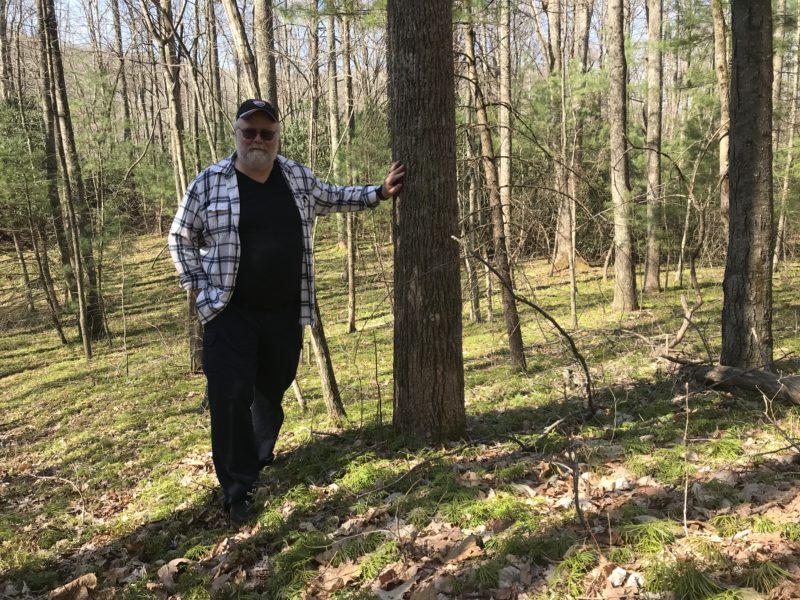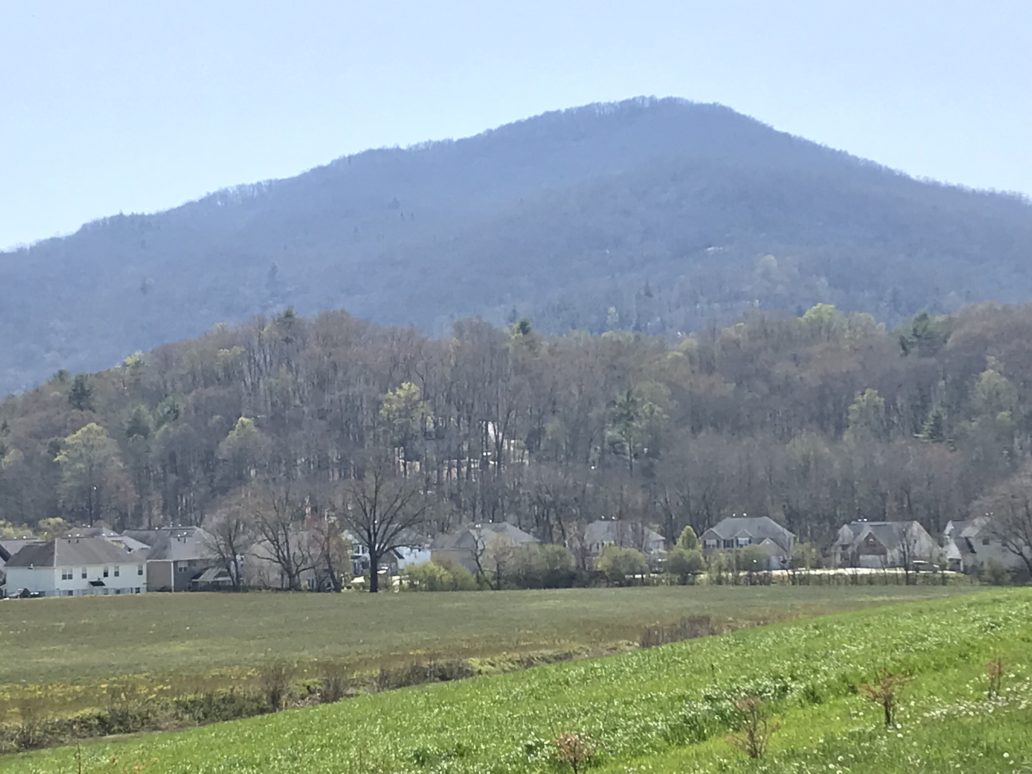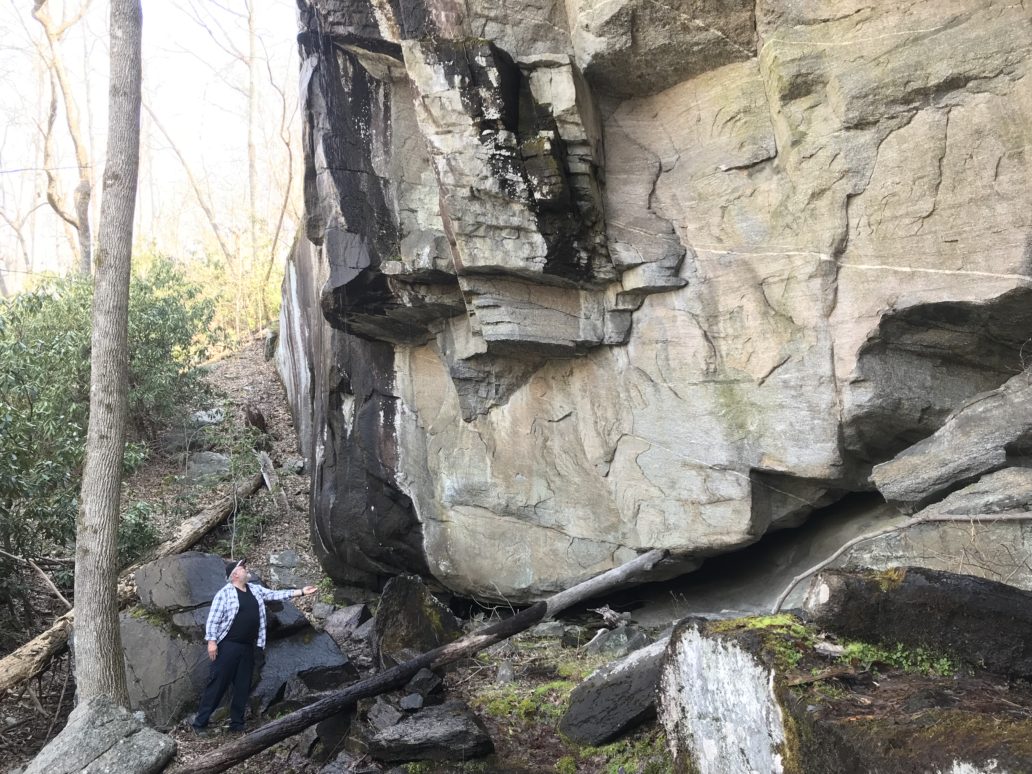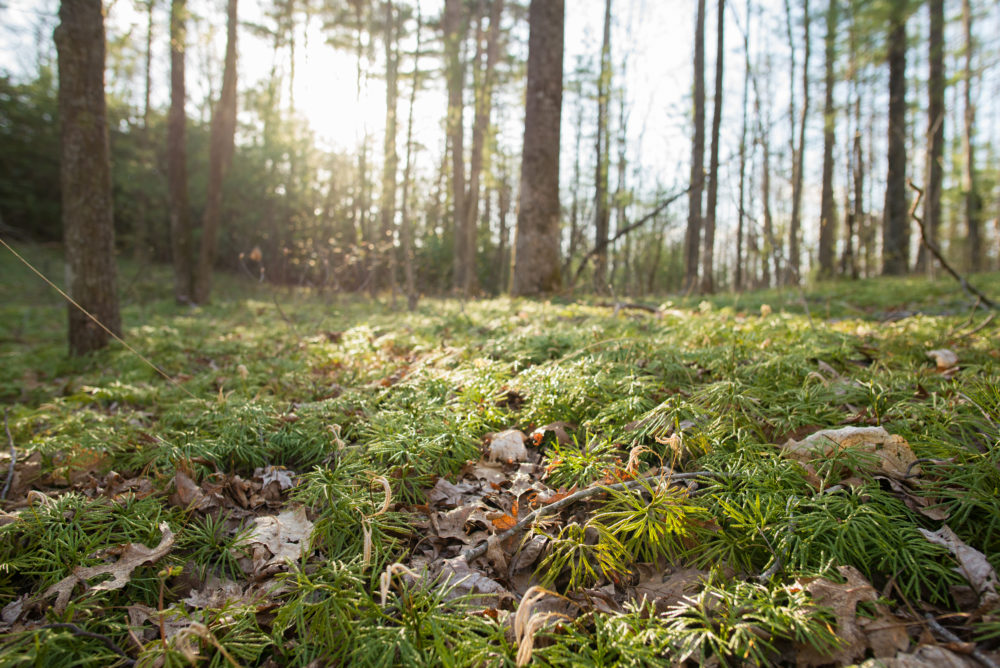A Legacy on Hightop Mountain

Joe Thomas donated land that was in his family for centuries for a publicly accessible nature preserve.
“There was a place that grabbed my heart when I was twelve years old that I wanted to build on,” Joe Thomas says, walking on Hightop Mountain, near Fletcher. “This is it.”
There’s a patch of forest floor that is carpeted in evergreen ground cedar although most of the woods are still gray and brown, in early spring. The land curves gently, nearly level. As a boy, Joe planned to build a Victorian house here, with a turret. He pictured a fishing pond on the creek. It was the place he’d eventually pass on to his kids, the way his mother would pass it to him, same as his grandfather passed it to her.
“Because it’s enclosed here, this little swale,” he says, “to me it feels like the earth is cradling you. You’re protected and the worries of the world can’t get into you.”
He never built that house, although this is one of the places he’d like to have his ashes scattered. Joe, who is sixty, jokes that he’s semi-retired because he only works one job—second shift as a security guard. He used to work one and a half, mostly factory work. The money never added up for that Victorian.
And family took it’s time coming into Joe’s life.
“I had hoped at one point to have children and pass it along,” he says. “That did not happen.”
His first marriage ended. When he found love and married again, two years ago, he became a stepfather, with nine grandchildren in the bargain. But his stepdaughters aren’t that interested in Hightop Mountain. So how could he pass on his family’s legacy?
Centuries of Family History

Joe’s family first came to the New World as indentured servants—Celts in the service of an English colonel. Unlike some masters, the colonel kept his end of the bargain and, after seven years, he set them free. As a reward for good service, he granted them some land in Hoopers Creek.
That land, which included Hightop, passed through the generations. During the Civil War, the story goes, one of Joe’s ancestors escaped from a Northern prison camp and made his way back to his wife at their mountain homestead.
Joe’s grandfather was a dairy farmer, the owner of Youngblood Family Farms. He did well enough to set up each of his six children with a business. For Joe’s mother, that was a general store and butcher shop. In a community where many people didn’t have money, she’d provide goods or butcher livestock in exchange for a cut of meat or a bushel of vegetables—or just I.O.U’s. “People around here helped each other,” Joe says. “Mama was rich in what really matters.”
He grew up in Arden, but he loved Hightop Mountain. His mother would drop him off, sometimes with friends, and they’d play in the woods, pretending to to be sparring bands or armies. “It was mostly a grand game of hide and seek in the midst of several hundred acres of timberland,” he says.
On the land, there are springs and creeks and cliffs; there are caves formed by overhanging rock. He says, “When you’re a ten year old kid, a cave can become a magical playhouse.”
“In My Heart, In My Soul”
Joe, who was teased as an “eco-freak” in high school, never wanted to cut trees on the land. He definitely didn’t want to sell it to developers—although they made offers, as suburbs sprang up around the mountain.
After college, he worked in theater and rock and roll, spending time on the road. Now he takes motorcycle trips with his wife as far as North Dakota or Wisconsin. “All my life,” he says, “I could be 500 miles away and I could basically get up in the morning and point. I could feel something literally coming back to home and it was always here.”
“I have felt this land in my heart, in my soul, for as long as I can remember,” he says.

There are trails in the woods that the local community has used for years. Joe wanted people to enjoy the land. But that came with challenges—like dirt bikers who tore through the woods, off trail, and caused erosion. “As much as I love motorcycles,” he says, “I was one man trying to keep up. I didn’t want to post the land so that nobody could use it, but I’ve tried to steward it with responsible land use.”
He wasn’t making income from the property. Instead, he worked to pay the taxes. He got behind. Eventually, he found himself facing a steep bill for back taxes.
He says, “I was kind of frantic because I didn’t want it to be sold at auction.”
Youngblood Farms Preserve
A friend had an idea. He pointed Joe in the direction of Conserving Carolina. Joe started talking with Tom Fanslow, the land protection director, and a solution took shape in his mind. He could donate his property to the land trust, as a nature preserve. It would remain a place of natural wonders. He could still go there. And other people could experience the woods, too.
“My fear was that it was going to turn into another gated community,” he says. “While that is fine, I would like places like this to remain where anybody can go in and enjoy them, just like Pisgah Forest.”
In 2017, Joe donated over 98 acres to Conserving Carolina, asking no payment except that they settle the taxes. He made one request, that the property bear the name of his mother’s family—as Youngblood Farms Preserve.
He could have sold the land and retired with money in the bank. But, to his mind, he wouldn’t be rich in what matters.
“I’ve always considered myself more of a steward than an owner here. Basically, I consider this passing the stewardship.
That’s what I’m counting on Conserving Carolina to do,” he says. “Stewardship means protecting something wonderful and natural for as long as possible, hopefully in perpetuity. I did it for most of 35 years, and unfortunately was physically and financially incapable of continuing. It’s difficult for an old hillbilly like me to admit that it’s time to pass the torch.”
Joe’s legacy preserves access to trails in an area with few public parks, as well as scenery that people enjoy from the valley. It protects natural habitat in an area under intense development pressure—a safe haven for wild things, including rare plants and animals. In honor of his gift, Conserving Carolina made Joe one of the recipients of the 2018 Lela McBride Stewardship Award at Land Lovers Day yesterday, on April 28.
What matters more to Joe is the experiences the land will offer. He says, “That’s what stewardship means to me—keeping it there for the community.”
